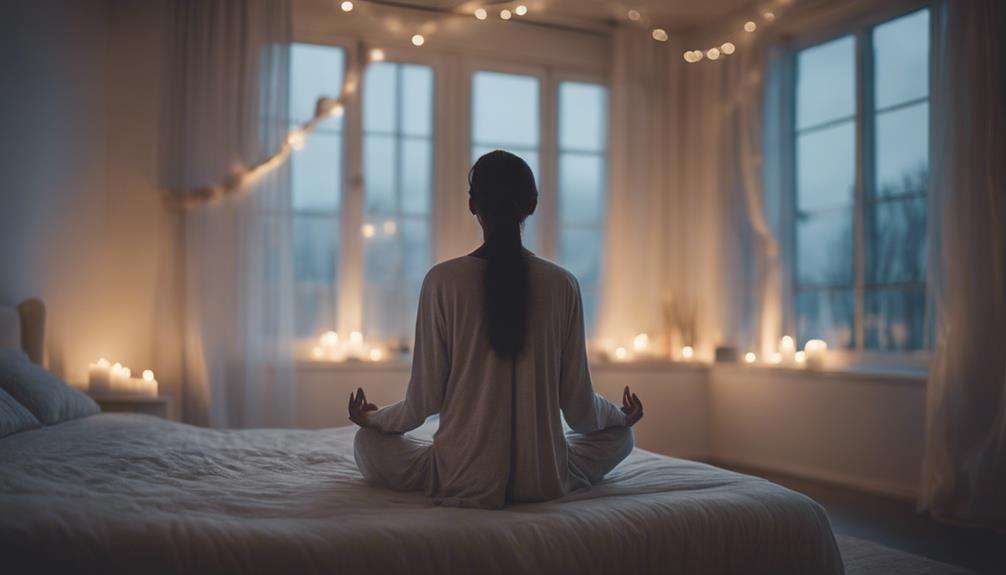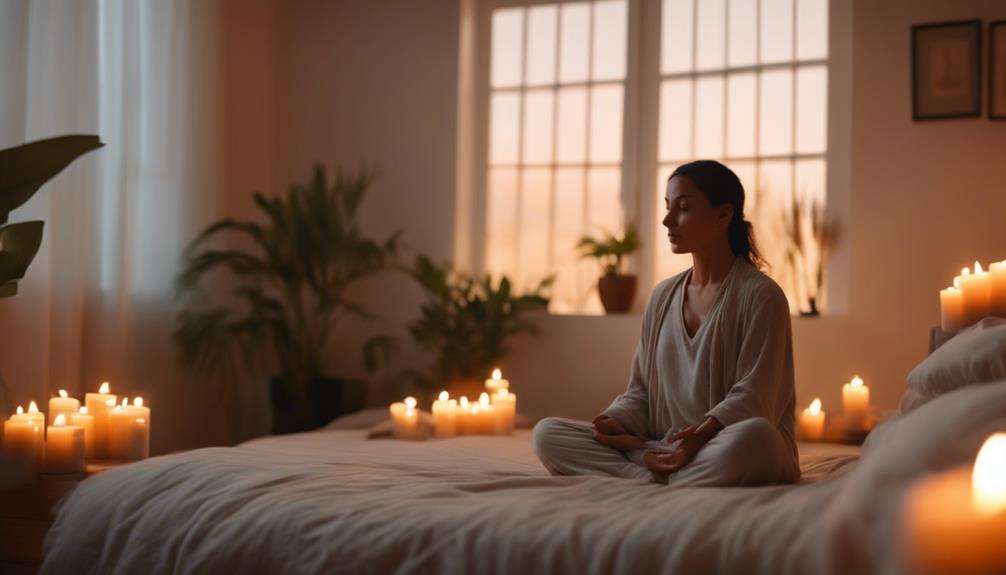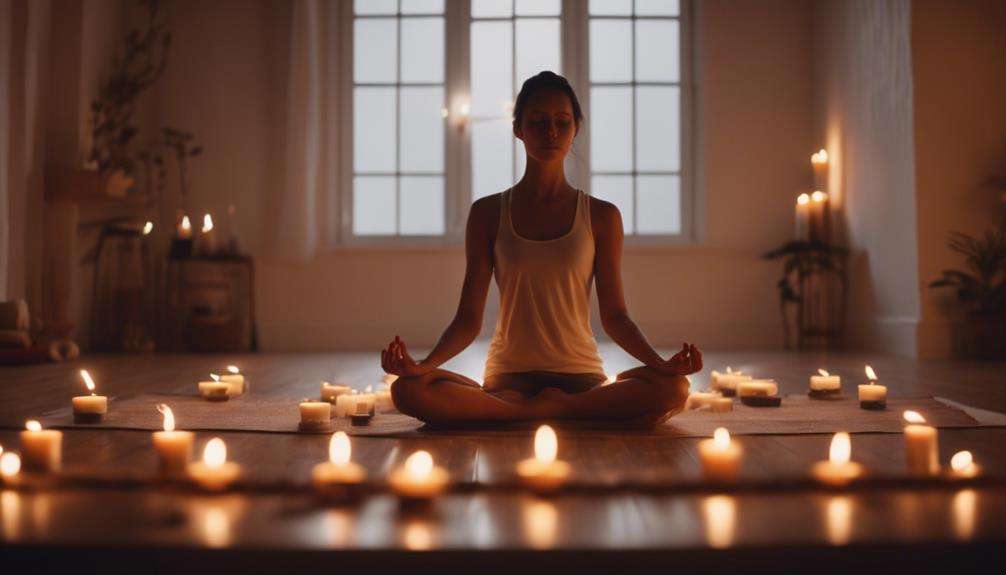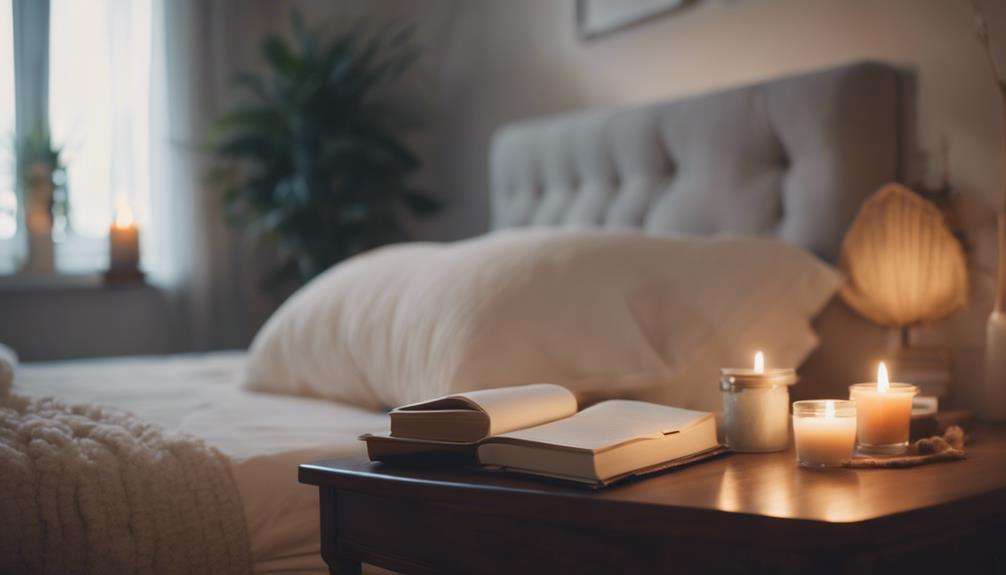Did you know that approximately 50% of adults worldwide experience occasional insomnia?
Discover how meditation can be the key to unlocking better sleep quality and a more restful night. By incorporating meditation into your bedtime routine, you can tap into a range of benefits that go beyond just relaxation.
Let's explore how this ancient practice can transform your sleep patterns and help you achieve a deeper, more rejuvenating rest.
Key Takeaways
- Meditation promotes relaxation, reduces stress, and improves overall sleep quality.
- Different meditation practices like mindfulness and body scan help calm the mind and body.
- Yoga poses and relaxation techniques before bed aid in reducing muscle tension for better sleep.
- Meditation techniques, when integrated into a bedtime routine, support anxiety management and restful sleep.
Benefits of Meditation for Sleep
By promoting relaxation through calming breathing, reducing heart rate, and slowing brain waves, meditation offers significant benefits for improving sleep quality. Mindfulness practices during meditation help in reducing stress levels, which is a common disruptor of sleep patterns. When stress is managed effectively through meditation, the mind is calmed, and the body is prepared for a restful night's sleep.
Body scan meditation, a technique where one focuses on different parts of the body, can help in releasing tension and promoting a state of relaxation conducive to falling asleep faster and experiencing fewer sleep disturbances.
Regular meditation practice has been linked to better sleep quality, as it aids in calming the mind and preparing it for rest. The physical relaxation response triggered by meditation helps in combating anxious thoughts and reducing physical symptoms of stress, leading to a tranquil state that's beneficial for achieving a deeper and more rejuvenating sleep.
Incorporating various meditation techniques into your routine, such as concentrative, mindfulness, transcendental, loving-kindness, and body scan meditation, can significantly contribute to improving sleep patterns and overall well-being.
Types of Meditation Practices
When considering types of meditation practices for better sleep quality, it's essential to understand various techniques like:
- Concentrative meditation
- Mindfulness meditation
- Transcendental meditation
- Loving-kindness meditation
- Body scan meditation
These methods offer unique benefits such as relaxation, heightened awareness, transcendence of thoughts, compassion cultivation, and improved body awareness, all contributing to a peaceful state of mind conducive to better sleep.
Meditation Techniques Overview
Exploring various meditation techniques can provide valuable insights into different practices that promote relaxation and mental clarity, ultimately enhancing sleep quality.
Concentrative meditation involves focusing on a single point like breath, sound, or an object to promote relaxation and mental clarity.
Mindfulness meditation encourages awareness of thoughts and sensations without judgment, aiding in calming the mind and improving sleep quality.
Transcendental meditation uses a mantra to achieve a state of pure awareness and promote relaxation for better sleep.
Loving-kindness meditation cultivates compassion and positive emotions towards oneself and others, contributing to a peaceful mindset for improved sleep.
Body scan meditation involves systematically scanning the body for sensations to enhance relaxation, body awareness, and promote better sleep patterns.
Benefits of Meditation
What're the benefits of practicing different types of meditation for improving sleep quality?
Various meditation practices offer unique advantages for enhancing sleep.
Mindfulness meditation, by fostering a relaxation response and reducing stress through heightened awareness, can positively impact sleep quality.
Body scan meditation promotes relaxation and body awareness, potentially contributing to better sleep.
Concentrative meditation, such as focusing on the breath, sound, or an object, aids in calming the mind and promoting better sleep patterns.
Transcendental meditation, which involves the repetition of a mantra, can help achieve a state of pure awareness, potentially improving sleep quality.
Additionally, loving-kindness meditation, by cultivating compassion and positive emotions, can lead to a calmer mind and enhanced sleep quality.
Mindfulness Meditation Techniques

Mindfulness meditation techniques, such as focusing on present awareness without judgment and incorporating deep breathing exercises, are effective for promoting relaxation and reducing stress levels. When practicing mindfulness meditation for better sleep quality, consider the following:
- Body Scan Meditation: This form of mindfulness practice involves systematically scanning your body to increase awareness of tension and promote relaxation, potentially leading to improved sleep outcomes.
- Deep Breathing Exercises: Incorporating deep breathing techniques into your mindfulness meditation routine can help calm the mind, reduce stress, and enhance relaxation, creating a conducive environment for better sleep.
- Cognitive Behavioral Therapy Integration: Mindfulness meditation plays a pivotal role in cognitive behavioral therapy for insomnia, providing individuals with self-regulation tools for breathing and stress reduction, ultimately aiding in improving sleep patterns.
Guided Meditation for Sleep
To enhance your sleep quality, consider incorporating guided meditation sessions led by an instructor to induce relaxation and improve your overall sleep experience.
Guided meditation for sleep involves following a meditation leader's instructions, which often include soothing voice guidance, visualization techniques, and breathing exercises to calm your mind and body before bedtime.
Research has shown that guided meditation can effectively reduce stress, anxiety, and racing thoughts that may hinder falling asleep. These sessions are readily accessible online, through apps, and in meditation classes, making them suitable for beginners seeking better sleep.
Qigong for Better Sleep

Incorporating Qigong into your daily routine can significantly enhance your sleep quality by promoting relaxation and reducing stress and anxiety. Qigong, a mind-body practice, combines gentle movements, breathing techniques, and meditation to improve sleep quality.
Here are three key ways in which Qigong can benefit your sleep:
- Stress Reduction: Regular practice of Qigong has been shown to reduce stress levels, which can help calm the mind and prepare the body for a restful night's sleep.
- Promotes Relaxation: The emphasis on mindfulness and deep breathing in Qigong exercises can create a sense of relaxation in both the mind and body, setting the stage for better sleep.
- Balancing Energy Flow: Qigong aims to balance the body's energy flow, known as Qi or Chi, which in turn can regulate sleep patterns and promote a more restorative sleep experience.
Tai Chi Practices for Sleep
Qigong's focus on gentle movements and deep breathing transitions seamlessly into the realm of Tai Chi practices for enhancing sleep quality. Tai Chi, with its slow and deliberate movements coupled with controlled breathing, offers a holistic approach to improving sleep. Studies suggest that Tai Chi can benefit individuals with sleep disorders by strengthening the mind-body connection, promoting relaxation, and reducing stress levels, all of which are crucial for achieving better sleep. This ancient practice has shown promising results in reducing insomnia symptoms and enhancing overall sleep patterns.
Moreover, regular Tai Chi practice aids in regulating the nervous system, releasing physical tension, and cultivating a tranquil mental state conducive to restful sleep. By incorporating Tai Chi into your bedtime routine, you can effectively wind down, quiet your mind, and prepare your body for a rejuvenating night's rest. Embracing Tai Chi as part of your nightly ritual can help create a peaceful environment that promotes improved sleep quality.
Yoga Poses for Improved Sleep
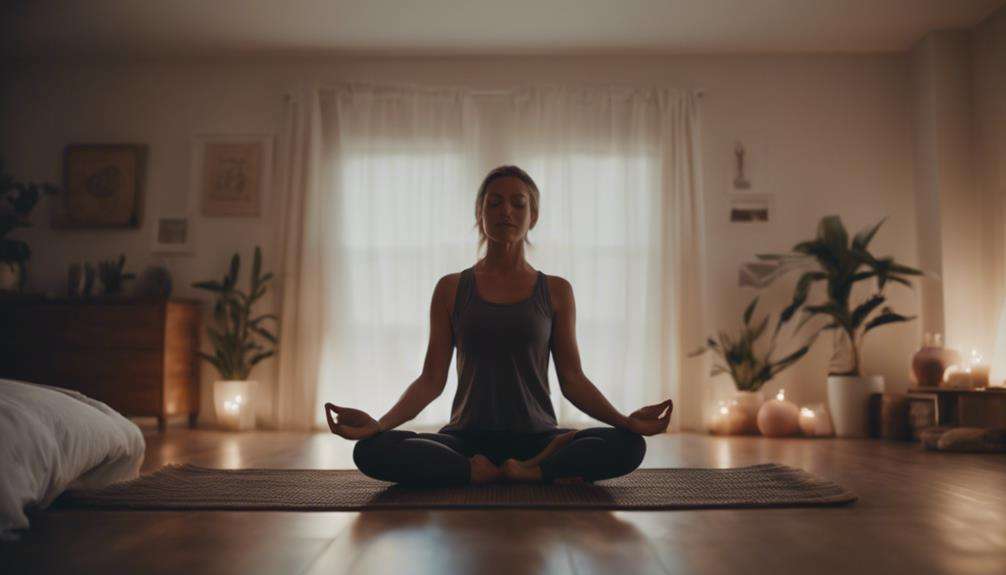
Certain yoga poses, such as Legs Up the Wall and Child's Pose, have been shown to promote relaxation and reduce stress, potentially aiding in achieving better sleep quality.
Incorporating Corpse Pose and Standing Forward Bend into your bedtime routine can help in total relaxation and release tension in the back and hamstrings, preparing your body for a restful night's sleep.
Gentle twists like Supine Spinal Twist can also be beneficial in releasing tension in the spine and calming the nervous system, potentially improving the quality of your sleep.
Poses for Relaxation
To enhance your sleep quality, consider practicing yoga poses like Child's Pose, Legs Up the Wall, and Corpse Pose for relaxation before bedtime. These poses help release tension, calm the mind, and reduce stress levels, promoting improved sleep quality.
- Child's Pose: Stretches the hips, thighs, and ankles, inducing a sense of calmness.
- Legs Up the Wall: Promotes relaxation by draining lymph and lactic acid from the legs, reducing fatigue.
- Corpse Pose: Encourages deep relaxation and helps quiet the mind, preparing you for restorative sleep.
Bedtime Routine Integration
Incorporating gentle yoga stretches into your bedtime routine can effectively reduce muscle tension and enhance the quality of your sleep.
Yoga poses like Child's Pose, Legs Up the Wall, and Corpse Pose are particularly beneficial for relaxing the body and mind before sleep. Research shows that practicing these poses can lead to improved sleep patterns, such as falling asleep faster and staying asleep longer.
Specific poses like Cat-Cow, Forward Fold, and Easy Pose help calm the nervous system, preparing your body for a restful night's sleep. Engaging in yoga before bed also aids in stress reduction, anxiety management, and overall relaxation, contributing to a peaceful bedtime routine.
Consider integrating these yoga poses into your nightly regimen for a more restful sleep experience.
Yoga Nidra for Deep Rest
How can Yoga Nidra assist in achieving deep rest and improving sleep quality?
Yoga Nidra, a guided meditation practice, offers a pathway to deep relaxation and enhanced sleep quality. Here are three ways in which Yoga Nidra can benefit your sleep:
- Deep Relaxation: Through a systematic body scan and heightened awareness of sensations, Yoga Nidra helps release tension and promote a state of profound relaxation, preparing your body for restful sleep.
- Stress and Anxiety Reduction: By calming the nervous system and guiding you towards a tranquil state, Yoga Nidra aids in reducing stress and anxiety levels, creating a conducive environment for better sleep.
- Overall Well-being Improvement: The practice of Yoga Nidra not only enhances sleep quality but also contributes to an improved sense of well-being, making it a valuable tool for addressing sleep disturbances and insomnia.
Incorporating Yoga Nidra into your bedtime routine can be a powerful way to cultivate deep rest and boost your sleep quality.
Potential Benefits of Meditation

Can meditation effectively enhance sleep quality by targeting specific aspects of relaxation and stress reduction?
Meditation has been shown to promote relaxation by calming breathing, reducing heart rate, and slowing brain waves, all of which contribute to better sleep quality.
Mindfulness meditation, in particular, focuses on addressing anxious thoughts and physical stress symptoms, leading to improved mental outlook and better pain management, ultimately enhancing sleep.
Various meditation techniques such as concentrative, mindfulness, and body scan meditation help individuals achieve a state of calm that's conducive to improved sleep.
Research indicates that meditation positively impacts sleep patterns and quality, making it a valuable tool for those experiencing sleep disturbances.
Implementing meditation for sleep involves creating a quiet environment, practicing deep breathing, and adopting a comfortable posture to facilitate relaxation and focus, all of which contribute to better sleep quality.
Risks and Considerations of Meditation
When considering meditation, it's essential to be aware of potential risks and side effects that may arise.
Some individuals might experience feelings of frustration or boredom during practice, while in certain cases, meditation can lead to increased anxiety or negative emotions.
If you have specific mental health conditions, it's crucial to consult a healthcare provider before starting meditation to ensure your safety.
Meditation Safety Tips
To ensure a safe and beneficial meditation practice, individuals should keep key considerations in mind. Here are some meditation safety tips to help navigate your practice:
- Consult Healthcare Provider: Individuals with specific mental health conditions should seek guidance from a healthcare provider before starting meditation.
- Practice Moderation: Avoid overexertion in meditation to prevent physical discomfort or injury; remember that moderation is key.
- Seek Experienced Practitioners: Approach meditation with an open mind and consider seeking guidance from experienced practitioners when needed. Their expertise can enhance your practice and ensure a positive experience.
Potential Side Effects
Considering the potential side effects and risks associated with meditation is crucial for maintaining a safe and beneficial practice. While meditation is generally safe, some individuals may experience mild side effects such as frustration or boredom. In certain cases, it can even exacerbate anxiety or negative emotions, especially for those with specific mental health conditions. Caution is advised, and consulting a healthcare provider before starting a meditation practice is recommended for individuals with mental health concerns.
Overexertion in meditation may lead to physical discomfort or injury, underscoring the importance of moderation and paying attention to your body's signals. To navigate potential risks effectively, approaching meditation with an open mind and seeking guidance from experienced practitioners can help ensure a positive experience.
Frequently Asked Questions
How Can Mindfulness Lead to a Healthier Sleeping Pattern?
Mindfulness techniques promote a healthier sleeping pattern by activating the relaxation response in your body. By reducing stress and improving sleep hygiene through a consistent bedtime routine, you can enhance the mind-body connection and alleviate sleep disturbances.
What Makes a Good Sleep Meditation?
When crafting a good sleep meditation, focus on guided visualization, deep breathing, progressive relaxation, body scans, sleep music, mind-body connection, stress reduction, and sleep hygiene. These techniques promote relaxation and prepare you for rest.
Can Meditation Replace Sleep Entirely?
Meditation benefits sleep quality by promoting relaxation and reducing stress, aiding in combating sleep deprivation. While meditation techniques enhance the mind-body connection, it cannot replace sleep entirely. Both sleep and meditation are crucial for optimal health.
Is Meditation More Restorative Than Sleep?
Meditation benefits sleep quality by being as restorative as sleep. It enhances the mind-body connection, reduces stress, and promotes relaxation through mindful breathing. Regular practice leads to improved mental outlook, reduced anxiety, and deep restorative sleep.
Conclusion
In conclusion, choosing meditation for better sleep quality can significantly improve your overall well-being.
Despite concerns about finding time to meditate, even just a few minutes a day can make a difference in your sleep patterns.
Research shows that meditation promotes relaxation and reduces stress, leading to better sleep quality.
By incorporating meditation into your daily routine, you can experience the benefits of improved sleep and overall health.
Give it a try and see the positive impact it can have on your life.

